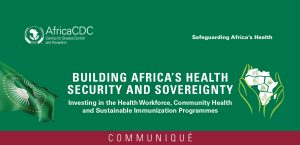Health data governance—a set of practices and policies designed to manage and control healthcare data throughout its lifecycle, ensuring its accuracy, privacy, security, and accessibility for authorized users —is once again on the political agenda this year.
Key decision-makers hope that a harmonised regional approach can help strengthen national frameworks, ensuring alignment and collaboration while safeguarding individual rights and building public trust.
The 38th Ordinary Session of the African Union Summit is taking place in Addis Ababa between February 15-16, 2025 and decision-makers and stakeholders will meet on the sidelines to discuss regional collaboration and advance plans for health data governance on the continent.
“The Summit presents an important inflection point to build on progress and stimulate further action in 2025 and beyond, including towards a regionally led framework and commitment on health data governance,” said Jean Philbert Nsengimana, Chief Digital Advisor, Africa Centres for Disease Control and Prevention (Africa CDC).
Strong national and regional leadership have ensured health data governance remains on political agendas, with notable advances over the past year. “This includes the work of the Africa CDC Flagship Initiative on health data governance, which is engaging governments and stakeholders in the region to strengthen health data governance approaches, including driving efforts towards a regionally led framework on health data governance,” said Nsengimana.
Africa CDC, Transform Health, Health Informatics in Africa (HELINA), and other regional partners are convening stakeholders for a discussion on health data governance, co-hosted by the Ministries of Health of Ethiopia, Rwanda, Zambia, Cameroon, Senegal and Uganda.
“We want to build and showcase political leadership on health data governance in Africa while galvanising action to drive this agenda both regionally and globally. The session aims to connect governments and regional stakeholders to build a network of champions in the region, forging the path towards a regional framework,” said Dr Nsengimana.
“Health data is the lifeblood of resilient health systems. In Africa, we are not just addressing the challenges of governance but seizing the opportunity to build frameworks that prioritize equity, trust, and ethical use,” Nsengimana added. “By fostering regional collaboration, we can ensure that health data becomes a catalyst for universal health coverage, stronger public health systems, and person-centered care, leaving no one behind,” he said.
The need to strengthen health data governance is increasingly recognised by governments within global and regional frameworks, strategies and commitments. In Africa, the AU Data Policy Framework (2022) recognises health data as a unique category of data that demands more rigorous protections and robust governance instruments and recommends the development of sector-specific data governance.
The AU Digital transformation strategy emphasises the need for AU Member States to have adequate regulations around data governance and recommends the adoption of a legal and regulatory framework for personal data protection and privacy. The Africa CDC Digital Transformation Strategy prioritises support for the development of legal and regulatory frameworks for digital health, including cross-border data sharing.
“When designed with equity, dignity, and ethical governance as core principles, data-driven and AI-enabled approaches can help expand coverage of health services, ensure the most disadvantaged communities have access to quality care, and build stronger, more people-centered public health systems,” said Nick Cain, Vice President of Strategy & Innovation, Patrick J. McGovern Foundation.
African countries have diverse contexts and needs, leading to varying approaches to health data governance. A regional framework, endorsed by AU member states, would support these efforts by fostering the exchange of experiences and good practices across the continent, establishing a common understanding of essential legislative provisions, promoting legal coherence across jurisdictions, enhancing trust, and enabling cross-border data sharing.
“National and regional leaders have acknowledged the critical need for robust health data governance. A regional framework and commitment would translate this into action, leveraging national insights to establish a unified approach and shared vision. As civil society, we urge governments and regional leaders to prioritise this to ensure the secure, equitable, and responsible use of health data,” said Mathilde Forslund, Executive Director, Transform Health.
Regional efforts towards strengthened health data governance have given rise to the Africa CDC Flagship Initiative on Health Data Governance, one of the actionable initiatives to advance Africa CDC’s Digital Transformation Strategy, while also responding to other regional and global frameworks and strategies. Launched during the 2023 Africa HealthTech Summit, the initiative aims to work with governments in the region to strengthen health data governance approaches, including through a regional framework, which would support governments in strengthening national legislation.
Africa CDC, Transform Health and HELINA have been working with national and regional partners to support these efforts, including through funding from the Patrick J. McGovern Foundation, to develop technical tools and resources, and support national efforts, towards stronger health data governance “Health data is not some random characters… at the heart of it, it is the record of real people, and their real experiences navigating various health statuses, from illness to wellness. Just as civilized societies treat everyone with respect and dignity, so should we treat health data, and every use we make of it,” said Steven Wanyee, President, Health Informatics in Africa.







